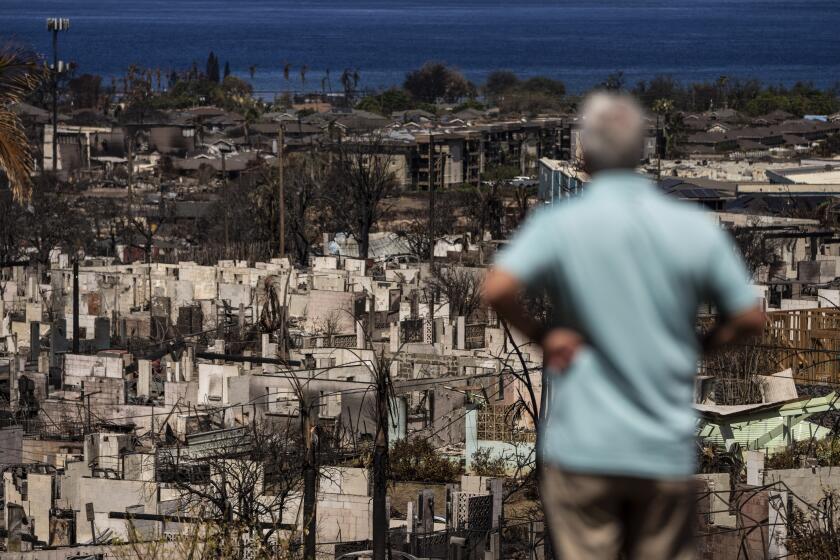Kostunica Offers Homage to Serb Hero, Nod to Leaders in Bosnia Visit
Yugoslav President Vojislav Kostunica entered the Serbian part of Bosnia-Herzegovina to help rebury a Serb nationalist hero Sunday, then rushed to bestow belated recognition on the ex-Yugoslav republic’s multiethnic leadership in Sarajevo.
The symbolism of the back-to-back events in the country most bloodied by recent Balkan wars was both powerful and contradictory. Since Kostunica replaced deposed strongman Slobodan Milosevic, other regional leaders have welcomed his peacemaking gestures while chafing at his prickly Serb nationalism.
Kostunica took his initial step toward healing Bosnia’s ethnic hatreds under strong pressure from international officials supervising the ethnically partitioned republic, where more than 200,000 people died in a 1992-95 war. Milosevic, who backed Bosnian Serb fighters in the conflict, never visited postwar Bosnia or moved to normalize relations.
“We are opening a new page in our relations,” Kostunica declared in Sarajevo, the Bosnian capital, standing beside the Serb and Muslim members of Bosnia’s three-man presidency and its foreign minister, a Croat, after agreeing to hold further talks on establishing diplomatic ties.
The 30-minute meeting was arranged on less than 24 hours’ notice after Muslim and Croat officials protested that Kostunica’s plan to attend a partisan Serb ritual on his first visit to their country was a breach of protocol that undermined his promise to respect its independence.
Two weeks into his presidency, Kostunica has also made conciliatory gestures to Croatia, which won its own bloody war of independence from the former Yugoslav federation, and Montenegro, which remains with Serbia in the rump Yugoslavia but is rife with secessionist sentiment.
So far, however, he has shown more sensitivity to ethnic Serbs than to those in the Balkans who have suffered at the hands of Serb forces.
His appearance here Sunday before 500 Serb nationalists was meant to show that he is one of them.
In a brand-new Serbian Orthodox chapel, perched on a hilltop above Trebinje, Kostunica stood reverently throughout a two-hour religious service Sunday for the late Serb poet Jovan Ducic, then sat and applauded another two hours of speeches in the poet’s honor. “God bless our president and all Christians,” intoned an Orthodox bishop in gleaming gold and white vestments.
Serbs revere Ducic for opposing communism and celebrating their ethnic heritage. He moved to the United States when World War II broke out, died in 1943 and was buried near Chicago. He had expressed a wish to be reburied in a church in his hometown, and that became possible when the hilltop chapel was completed this year with $1.5 million in donations from a Serb emigre to Chicago.
Aides to Kostunica said he had planned months ago to come to the reburial ceremony as a private citizen. His unwillingness to cancel the visit after taking office became one of the most controversial decisions of his presidency.
The Bosnian Foreign Ministry objected, worried that any encouragement from Kostunica to separatist Bosnian Serbs could destabilize the still-volatile country, where mass graves of Muslims killed by Serbs continue to be discovered.
Bosnia’s top international official, Austrian diplomat Wolfgang Petritsch, finally persuaded Kostunica to meet with the Bosnian leadership.
U.N. officials sent a helicopter to fly him from Trebinje to Sarajevo for the talks, which were held in an airport VIP lounge.
“He decided to go to Sarajevo to prevent the malevolent interpretation that this religious ceremony is a provocative act, which it is not,” said Vladeta Jankovic, an aide to Kostunica.
But a stridently nationalist mood prevailed among the Bosnian Serb crowd here--the kind of Serbs who turned against Milosevic not for starting ethnic wars but for losing them.
Among those present was the wife of Radovan Karadzic, the wartime Bosnian Serb leader who is wanted by an international war crimes tribunal in The Hague. Many worshipers voiced hope that their territory, an autonomous republic within Bosnia, would eventually become part of Serbia.
“If you ask me, we have no borders with Serbia,” said Nikola Miljanovic, a 31-year-old businessman here. “I have Muslim and Croat friends, but it would be better for all of us if we were not pushed to live together.”
Kostunica declined an invitation to speak at the ceremony but was greeted with full military honors by Bosnian Serb cadets.
Later, in Sarajevo, a Bosnian journalist asked him whether normal relations between the two countries would bring a formal apology for Milosevic’s wrongdoings against Bosnians.
Kostunica was cautious. “I am one of those politicians who will not use empty words, empty promises and empty apologies to in some way overcome all the complications of our relations,” he said.
“With all that has happened, all the crimes that were carried out and the victims there were on all sides, all this can be cured only by the truth. One-sided statements . . . will resolve nothing in our relations.”
More to Read
Start your day right
Sign up for Essential California for news, features and recommendations from the L.A. Times and beyond in your inbox six days a week.
You may occasionally receive promotional content from the Los Angeles Times.






